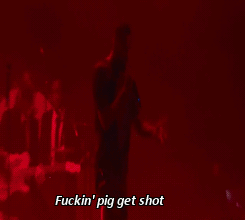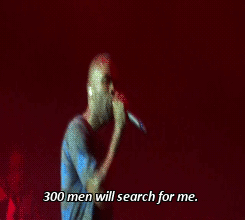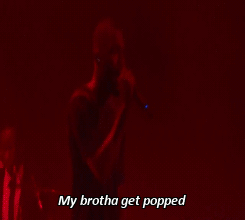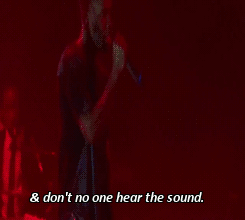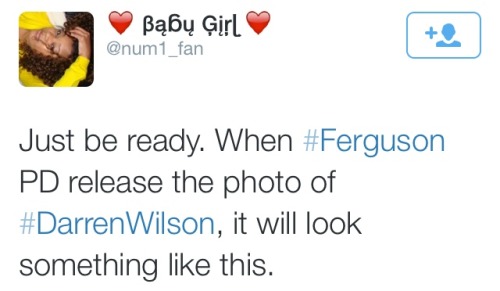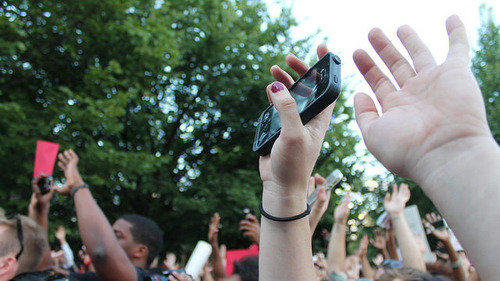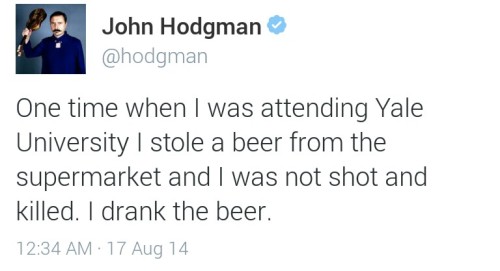Written by Greg Howard
The United States of America is not for black people. We know this, and then we put it out of our minds, and then something happens to remind us. Saturday, in the St. Louis suburb of Ferguson, Mo., something like that happened: An unarmed 18-year-old black man was executed by police in broad daylight.
By now, what's happening in Ferguson is about so many second-order issues—systemic racism, the militarization of police work, and how citizens can redress grievances, among other things—that it's worth remembering what actually happened here.
Michael Brown was walking down the middle of the street in Ferguson's Canfield Green apartment complex around noon on Saturday with his friend Dorian Johnson when the two were approached by a police officer in a police truck. The officer exchanged words with the boys. The officer attempted to get out of his car. At this point, two narratives split.
According to the still-unnamed officer, one of the two boys shoved him back into the vehicle and then wrestled for his sidearm, discharging one shot into the cabin. The two ran, and the police officer once again stepped from his vehicle and shot at the fleeing teenagers multiple times, killing Brown.
According to Johnson and other eye witnesses, however, the cop ordered the friends to "get the fuck on the sidewalk," but the teenagers said they had almost reached their destination. That's when the officer slammed his door open so hard that it bounced off of Brown and closed again. The cop then reached out and grabbed Brown by the neck, then by the shirt.
"I'm gonna shoot you," the cop said.
The cop shot him once, but Brown pulled away, and the pair were still able to run away together. The officer fired again. Johnson ducked behind a car, but the cop's second shot caused Brown to stop about 35 feet away from the cruiser, still within touching distance of Johnson. Multiple witnesses say this is when Brown raised his hands in the air to show he was unarmed. Johnson remembered that Brown also said, "I don't have a gun, stop shooting!" The officer then shot him dead.
After that, the narratives dovetail again. Brown was left where he died, baking in the Missouri heat for hours, before he was removed by authorities. The officer was placed on paid administrative leave.
Eyewitness: Michael Brown Pleaded "I don't have a gun, Stop shooting"
Michael Brown is not special. In all its specificity, the 18-year old's death remains just the most recent example of police officers killing unarmed black men.
Part of the reason we're seeing so many black men killed is that police officers are now best understood less as members of communities, dedicated to keeping peace within them, than as domestic soldiers. The drug war has long functioned as a full-employment act for arms dealers looking to sell every town and village in the country on the need for military-grade hardware, and 9/11 made things vastly worse, with local police departments throughout America grabbing for cash to better defend against any and all terrorist threats. War had reached our shores, we were told, and police officers needed weaponry to fight it.
Officers have tanks now. They have drones. They have automatic rifles, and planes, and helicopters, and they go through military-style boot camp training. It's a constant complaint from what remains of this country's civil liberties caucus. Just this last June, the ACLU issued a report on how police departments now possess arsenals in need of a use. Few paid attention, as usually happens.
The worst part of outfitting our police officers as soldiers has been psychological. Give a man access to drones, tanks, and body armor, and he'll reasonably think that his job isn't simply to maintain peace, but to eradicate danger. Instead of protecting and serving, police are searching and destroying.
If officers are soldiers, it follows that the neighborhoods they patrol are battlefields. And if they're working battlefields, it follows that the population is the enemy. And because of correlations, rooted in historical injustice, between crime and income and income and race, the enemy population will consist largely of people of color, and especially of black men. Throughout the country, police officers are capturing, imprisoning, and killing black males at a ridiculous clip, waging a very literal war on people like Michael Brown.
The Case for Reparations
"There's a long history of racial tension and misunderstanding in this region," St. Louis Post-Dispatch columnist Aisha Sultan told me over the phone yesterday. "Especially on the north side."
This sort of thing—especially on the north side—is what gets glossed over a little too easily when we try to fit a particular incident into a broader narrative. Ferguson is a small town of 21,000, mostly white until the 1960s, when whites fled anywhere but where they were. Today, Ferguson, which is a bit north of St. Louis, is mostly black; Ferguson and St. Louis County police are mostly white. That fits a metropolitan area flanked by two rivers that divide neighborhoods and regions by race, the sixth-most segregated in the United States.
To people, like me, from the coast—I'm from Maryland—St. Louis can seem like a blank in the the middle of the country, a place where people and even ideas get stuck on the way to somewhere better, or at least somewhere else. But St. Louis is like New York (the fourth-most segregated metro in America), or Los Angeles, or Miami, or Dallas, or Washington, DC, only more so. Far from a blank, St. Louis is often regarded as the most American of America's cities.
"It is a microcosm of the rest of the country," Sultan said. "If this can happen in St. Louis, it can happen in any city."
It does. On August 5 in Beavercreek, Ohio, 22-year-old John Crawford was killed in a Walmart when a toy gun he had picked up from inside the store was apparently mistaken for a real gun. LeeCee Johnson, who had two children with Crawford, said that she was on the phone with him, and that his last words before she heard gunshots from police officers were, "It's not real."
On July 17 in Staten Island, New York, 43-year-old Eric Garner, a well-known presence in the neighborhood who sold illicit cigarettes and kept an eye on the block, was killed after breaking up a fight when NYPD officer Daniel Pantaleo used an illegal chokehold on the asthmatic man. "I can't breathe," he said, before he died. "I can't breathe."
On the night of September 14, 2013 in Charlotte, N.C., 24-year-old Jonathan Ferrell was killed after getting into a car accident. He climbed out of the rear window of the car, stumbled to the nearest house, and banged on the door for help. The homeowner notified the police, who showed up to the house. Ferrell was tased, and then an officer named Randall Kerrick shot and struck Ferrell 10 times.
There was Trayvon Martin in Sanford, Fla., and Oscar Grant in Oakland, Calif., and so many more. Michael Brown's death wasn't shocking at all. All over the country, unarmed black men are being killed by the very people who have sworn to protect them, as has been going on for a very long time now. It would appear that cops are not for black people, either.
After Brown's death came his demonization. First, we heard that Brown had run for stealing candy from a store. Then we were bombarded with a photo of Brown in a red Nike tank top on a stoop, posing for the camera.
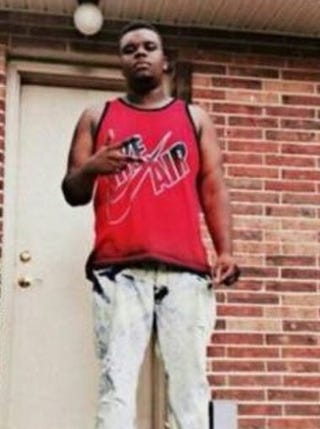
This photo, in which Brown was flashing a "gang sign"—a peace sign, actually—was presented as proof that the teenager was a thug; his friends and family now not only have to work through their grief, but against a posthumous slur campaign. Johnson described his friend in an MSNBC interview as cool and quiet. Brown's uncle, Bernard Ewings, said in a Sunday interview that Brown loved music. Brown's mother, Leslie McSpadden, said that he was funny and could make people laugh. He graduated from high school in the spring, and was headed to college to pursue a career in heating and cooling engineering. Monday would have been his first day.
By all accounts, Brown was One Of The Good Ones. But laying all this out, explaining all the ways in which he didn't deserve to die like a dog in the street, is in itself disgraceful. Arguing whether Brown was a good kid or not is functionally arguing over whether he specifically deserved to die, a way of acknowledging that some black men ought to be executed.
To even acknowledge this line of debate is to start a larger argument about the worth, the very personhood, of a black man in America. It's to engage in a cost-benefit analysis, weigh probabilities, and gauge the precise odds that Brown's life was worth nothing against the threat he posed to the life of the man who killed him. It's to deny that there are structural reasons why Brown was shot dead while James Eagan Holmes—who on July 20, 2012, walked into a movie theater and fired rounds into an audience, killing 12 and wounding 70 more—was taken alive.
To ascribe this entirely to contempt for black men is to miss an essential variable, though—a very real, American fear of them. They—we—are inexplicably seen as a millions-strong army of potential killers, capable and cold enough that any single one could be a threat to a trained police officer in a bulletproof vest. There are reasons why white gun's rights activists can walk into a Chipotle restaurant with assault rifles and be seen as gauche nuisances while unarmed black men are killed for reaching for their wallets or cell phones, or carrying children's toys. Guns aren't for black people, either.
Sunday was Brown's vigil, and several hundred people congregated in Ferguson. They began to march toward the Ferguson police station in protest. Police met them in full riot gear, with rifles, shields, helmets, dogs, and gas masks. Protesters yelled, "No justice, no peace!" They called the police murderers. They raised their hands in mock surrender, saying, "Don't shoot, I'm unarmed."
And then the protest turned violent, as some citizens began to break into, loot, and set fire to storefronts in their own community.
Police officers shot tear gas and rubber bullets. Thirty-two people were arrested that night. Two policemen were injured. There was nothing easy to make of it. It was a senseless and counterproductive attack on the community; it was the grief-stricken flailing of people who knew it could have been them, or their friends, or their brothers or sons. Whatever it was, it was met with force.
On Monday morning, Sultan went back to Ferguson, where she witnessed citizens cleaning up debris from the night before. Some were shocked by the violence; others said that they'd been backed against a wall, forced into necessary evil. Sultan interviewed an 11-year-old boy about the rioting. "It seems like police are about to go to war with the people," he said.*
On Monday night, police again took the streets as demonstrators again marched in nonviolent protest, holding their hands high. Police again fired rubber bullets and tear gas, and again blocked off the main streets, not allowing anyone in or out. Police were photographed sweeping into side streets, and pointing guns over fences into backyards. It spilled over into today. They ran helicopters and drones over all of it; they shot tear gas; they ran up on citizens with guns drawn.
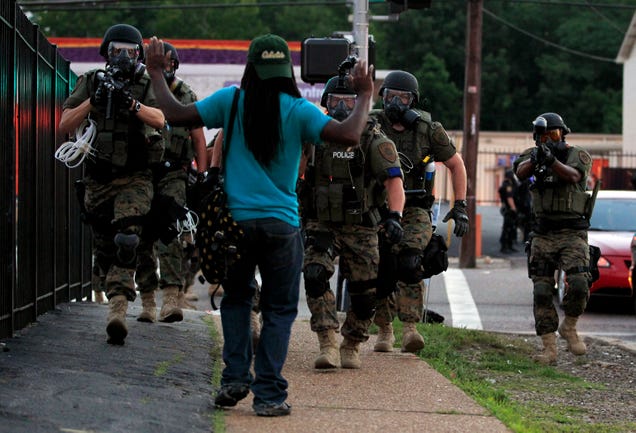
"Return to your homes," they yelled over megaphones.
"This is our home," the people of Ferguson answered. There wasn't—there isn't—much more to say.
This essay was prepared or accomplished by Greg Howard in his personal capacity for deadspin.com. The opinions expressed in this article are the author's own and do not reflect the views or opinions of Dorian Gray

